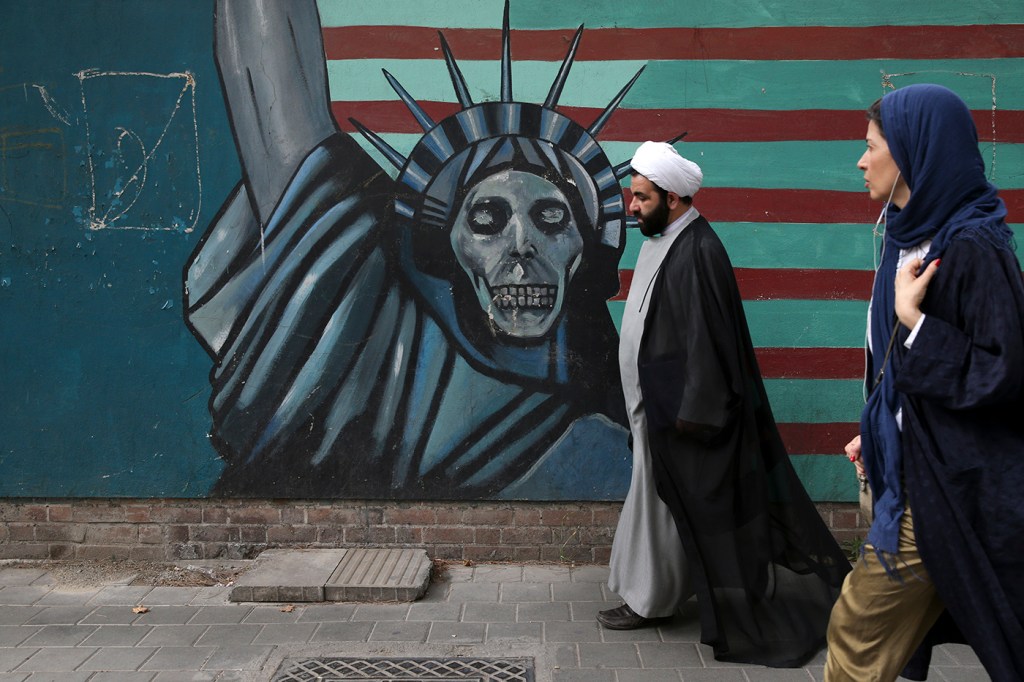So the US has pulled out of the Iran nuclear deal. What does that mean to me?

President Donald Trump has withdrawn the United States from the landmark international nuclear deal with Iran, announcing that stringent economic sanctions against Tehran will be reinstated.
Trump called the deal, which was signed in 2015 under the Obama administration, “defective” and “terrible” and warned Iran against renewing its nuclear program. Some foreign policy experts have questioned the move, while leaders of European nations in the deal expressed regret and concern.
We asked three faculty members—Max Abrahms in political science, Kamran Dadkhah in economics, and Valentine Moghadam in international affairs—to examine the impact of the decision.
Abrahms, a terrorism theorist, questioned how the United States’ move to withdraw from the deal without a “Plan B” would make the nation safer. Dadkhah, a Middle Eastern economies expert who worked in Iran as director of macroeconomic planning and a chief economist, said “the average American won’t feel anything because of this.” Moghadam, professor of sociology and international affairs, raised the possibility of a broader war in the region.
What is your assessment of Trump’s decision to withdraw from the deal?
Abrahms: I wasn’t particularly impressed by the terms of the nuclear deal. Critics have pointed out several non-negligible problems—for example, curbs on nuclear development subsiding after 10 or 15 years and limitations on inspections. But I’m also not a proponent of withdrawing from the nuclear deal especially in the absence of a better one. The inspections regime led by the International Atomic Energy Agency would in all likelihood have detected the transition to nuclear weapons. And it just doesn’t seem like there’s any Plan B. I thought that Trump might propose a way to bridge the gap with Iran by fixing some of the deal limitations. That’s what the Europeans wanted, too. But Trump simply walked away. How we’re better off in terms of U.S. national security, I’m not entirely clear.
Going forward, I’ll be interested in what Europe does and whether European parties side more with the United States or continue honoring the deal. I’ll be particularly interested in what happens in Syria. I think we’re on the precipice of a major outbreak of violence there. And then there’s North Korea; it’s been said that by withdrawing from the deal the U.S. is sending a powerful message to Kim Jong-un that we don’t honor our nuclear commitments. However, another interpretation—and a point I made on NPR—is that the nuclear withdrawal improves Trump’s credibility. After all, he campaigned on withdrawing from the deal, and he kept his word.
You mentioned the recent escalation of violence in Syria. Is there a correlation between the violence there and Trump’s decision to withdraw from the Iran deal, or is it just a coincidence?
Abrahms: I don’t think it’s a coincidence. The relationship is causal in two ways. Iran is no longer incentivized to moderate its behavior in any way because the United States walked away from deal. And Israel knows the White House will support its attacks against Iran and its proxies. In his announcement earlier this week ditching the deal, Trump explicitly referenced Israeli Prime Minister Benjamin Netanyahu’s claim of having new evidence implicating Iran in developing a nuclear weapon. There is no daylight now between Trump and Netanyahu when it comes to Iran. This unprecedented U.S.-Israeli convergence in threat perceptions gives Israel newfound leeway to launch attacks. The situation in Syria is the most dangerous one in the world. It’s a real tinderbox. From a geopolitical perspective, it’s more troubling than ever before.
Will this decision have an economic impact on the United States? Will it affect the average American’s wallet?
Dadkhah: Given the size of the U.S. economy and the size of the global economy, this really won’t affect Americans much. The average American won’t feel anything because of this. It will impact some American companies that do business there, but not the American economy overall, which right now is doing great. The price of U.S. crude oil has gone above $70 per barrel recently, but it’s not the highest it’s ever been. Also, the price of oil depends on so many different factors.
What is important, though, is what could happen later on. This deal was extremely beneficial to Iran. Iran got a huge amount of money and it was spending it to cause problems in Syria, Yemen, Lebanon, and Iraq, and sooner or later that would’ve affected American interests. While the average American might not feel economic impact from that, the fact is that several hundred thousand Syrians have been killed. Israel is also feeling like it’s threatened because Iran, using this money, has built up bases there and they feel that something could happen. If that kind of war broke out, or if a conflict broke out with Saudi Arabia, which is an ally of the United States, the cost to America would’ve been heavy. So in a way, cutting off this money to Iran is not such a bad deal.
You mentioned it could impact American companies. In which ways? And how about with regard to Iranian exports to the United States?
Dadkhah: This deal would have helped, for example, American companies selling airplanes to Iran, or perhaps investing in oil platforms. The problem this raised, however, is that these airplanes could’ve been used for military purposes and therefore some government restrictions were placed on this. In the long run, there’s no question those airplanes would’ve been used for other purposes. But now that the United States has withdrawn, companies won’t be able to continue with those deals with Iran.
On the other side, Iran’s top exports are oil and gas, but the United States gets most of its oil from other places. There are other smaller exports to the U.S., such as pistachios. But actually, right now in California, they are growing a lot of pistachios and production is increasing.
What are the short-term implications of this move by the United States?
Moghadam: The real agenda behind the Trump decision to withdraw—which has made Netanyahu and the Saudis very pleased—is to provoke Iran into a war, something that Israel and Saudi Arabia in particular seem to desire. The war would weaken Iran’s military and thus its influence in the region (in Syria, Iraq, Lebanon, among the Houthis), so as to enable Saudi Arabia and Israel to dominate the region, leaving U.S. hegemony unchallenged and Russia marginalized.
And the long-term implications?
Moghadam: U.S. global leadership and legitimacy will be at an all-time low, as countries will realize that they cannot trust the United States to honor its treaties and international obligations. America’s political system—which seems to enable one president to overturn decisions made by a predecessor—will appear woefully dysfunctional and more like a dictatorship than a mature procedural democracy with established institutions.





